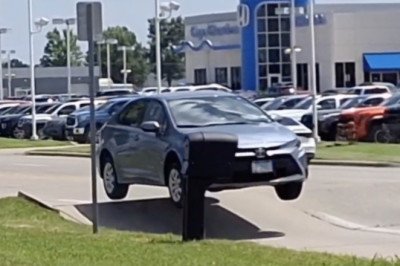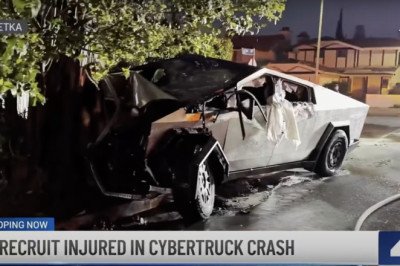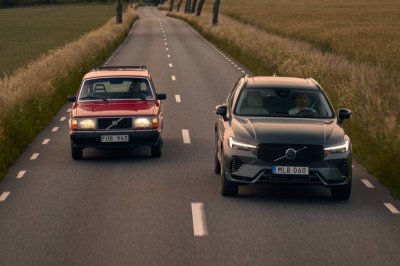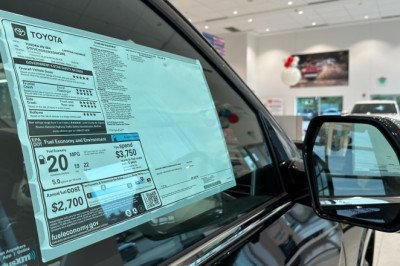
By MARK HOOKHAM, ASSISTANT EDITOR, INVESTIGATIONS
Crouched in front of a suburban home in the middle of the night, the masked car thief silently raises a gadget to a downstairs window and waits for it to detect the pulse from a set of electronic car keys in the living room.
A black-clad accomplice lingering just yards away in the shadows next to a £25,000 family SUV holds a second device near the vehicle’s front door.
In a brazen display of criminality, the pair are demonstrating to a TV film crew the ease and speed with which they can steal luxury cars from the driveways of unsuspecting owners.
Almost immediately a light on the second device by the car blinks green as it receives the signal from the key fob from inside the home, which has been relayed to it and ‘amplified’ by the gadget by the window.
The car unlocks and one of the thieves jumps into the driver’s seat, while his partner pauses by the house just long enough to capture the signal again to activate the keyless ignition.
The engine roars to life and the masked men speed into the night. The audacious exercise has taken less than 20 seconds.
The shocking footage is part of an extraordinary Channel 4 Dispatches investigation into an international network of organised crime gangs that is fuelling Britain’s epidemic of car thefts.
A London car thief, who gave his name only as ‘T’, and his accomplice demonstrate how to unlock a 2024 Vauxhall Mokka using a pair of high-tech devices they had bought off the dark web
An astonishing 129,700 cars were stolen in the UK last year, according to figures published by the Office for National Statistics. That equates to 355 per day – or one car stolen every four minutes.
Instead of the old-fashioned methods of smashing locks or forcing windows, three out of five vehicles stolen are now broken into using sophisticated ‘key-hacking’ techniques.
Modern fobs for smart keys, which unlock the car as the owner approaches without the need to press a button, are now common, offering glaring security loopholes for crime gangs to exploit.
An active London car thief, who gave his name only as ‘T’, and his accomplice agreed to demonstrate how this is done to Dispatches by unlocking a 2024 Vauxhall Mokka that they claimed to have recently stolen, using a pair of high-tech devices they had bought off the dark web – a hidden corner of the internet accessed using specialist software and used by criminals.
‘So this is our amplifier,’ T tells investigative journalist Matt Shea. ‘This is catching the signal from the key inside the house.’
The two criminals – effectively car thieves for hire – reveal they use this high-tech trickery to steal around 20 vehicles each month, which they deliver for cash to members of a much bigger criminal enterprise.
The amount they get paid by those higher up the gang hierarchy depends on the car, with a Range Rover earning them £5,000.
Some vehicles, T explains, are easier to key jack – or steal – than others. Luxury Range Rover Evoques are ‘easy, easy’, while a BMW 7 Series is ‘worth a decent amount’ to the gang. Teslas are more challenging.
‘The Teslas aren’t easy,’ he says. ‘I don’t think anyone’s figured that out yet because they are proper high-tech.’
The unrepentant thief shows no sympathy for his victims and reveals he was initially more concerned about his mother finding out than the police.
She is now, however, driving a new car with 2024 number plates (presumably stolen by her industrious son) and is therefore ‘happy’ with him, he says.
A thief holds a relay device by a living room window to detect the pulse from car keys inside
‘These cars are insured – that’s like a First-World problem,’ he sneers. ‘There’s bigger s*** going on out there. Your f****** Range Rover’s gone? Boo-hoo. Go and buy another one, man.’
Despite the scale of car theft, new figures obtained by the programme makers reveal that 70 per cent of those reported stolen in England and Wales are never recovered.
In London the figures are even more stark. There were 33,530 offences of ‘theft or unauthorised taking’ of a motor vehicle in the capital in 2024, but only 326 ‘positive outcomes’ – which can include a charge or a police caution – in these cases, representing a success rate of lower than 1 per cent.
The crime wave is also hitting motorists by pushing up insurance premiums. Indeed, the average cost of car insurance in the UK last year hit a record £995 – after rises of more than 50 per cent.
Insurance company Aviva said last year that owners of modern keyless vehicles were twice as likely to make a theft claim.
With the police seemingly unable – or unwilling – to stop car thefts, it is perhaps no surprise that some victims are taking matters into their own hands. Mia Forbes Pirie and her husband Mark Simpson revealed last week how they were able to track down their Jaguar E-Pace after it was stolen from outside their west London home because an Apple AirTag had been left inside.
They reported the theft to police, but after receiving what they described as a ‘vague’ response, the couple were forced to ‘steal it back’ themselves.
Most victims are not as fortunate, however, and the vast majority of stolen cars are never seen again.
An accomplice by an SUV holds a receiver
The Channel 4 investigation, which will be broadcast on Thursday, helps to explain why.
T reveals that the vast majority of the cars he steals are stripped for parts and then shipped abroad as part of a sophisticated organised crime operation.
‘A lot of these cars are getting broken for parts,’ he says. ‘A lot are getting shipped out [to] Albania, Bulgaria, Cyprus, Greece.’
The dismantling of the cars takes place in a network of secretive workshops known as ‘chop shops’. To avoid detection, these operations are usually hidden in abandoned warehouses, industrial estates, or remote areas. Some even use legitimate-looking repair businesses as a cover.
‘In this area, a lot of the garages are chop shops,’ T tells the Channel 4 reporter. His accomplice adds: ‘You could be standing no more than 100m away from one and not even know it.’
High-value components, some of which – such as engines, airbags and transmissions – can be sold individually for more profit than the entire vehicle, are loaded into containers and shipped abroad.
Huge scrapyards in the Middle East and Africa are also fuelling a lucrative trade in car parts – and the demand for stolen cars.
Sometimes vehicles are chopped in half and packed into shipping containers before being stripped down overseas. In other cases entire cars are shipped abroad without having been dismantled.
The film exposes a recent trend for stealing pick-up trucks and family SUVs, which are taken to sub-Saharan Africa where, because of poor road conditions, they can be sold at a premium.
The fake documents required to export the cars are bought by the criminals on the dark web. It is believed that the crime bosses co-ordinating the car theft gangs ensure the different elements of the operation – from the thieves who steal the vehicles using key-jacking to the chop shops and the export operation – are kept separate from each other to reduce the risk of detection.
The signal from the keys is relayed to the car and the doors unlock
In an extraordinary example of the international reach of the car theft gangs, the Dispatches team was able to track the journey of a car that was stolen this year from a north London driveway and then sent 1,000 miles to a bleak compound in Lithuania.
The blue Audi A4, which had been fitted with a sophisticated tracking device by its leasing company, was stolen from a young woman’s driveway in the early hours of February 5. Its tracker showed it being driven towards east London before the signal mysteriously went dead.
The following day the tracker resumed its signal – and showed that the car was 30 miles away near South Ockendon in Essex. The exact location was revealed to be a sprawling complex named Baldwins Farm.
The industrial site, which is used by multiple businesses, is surrounded by CCTV cameras, with drone footage showing dozens of parked vehicles and shipping containers. The car appeared to be parked in a wooded area on the edge of the site but for some reason its tracker struggled to transmit its precise location.
The Dispatches team used a high-tech detection device that found evidence that sophisticated electronic jamming technology was being used on the site.
The journalist interviewed another criminal who claimed he used to rent a shipping container at Baldwins Farm. He detailed how car parts would arrive at the site from illegal chop shops and be stored there before being sent on truck to ports and shipped abroad.
Describing the criminal enterprise’s elaborate ‘cell structure’, preventing those involved in one part of the chain from knowing the identities of others in the network, the masked man said: ‘Most of the time, half of the people, you don’t even know the names or who you are working with.’
The Audi A4 is believed to have spent five weeks at Baldwins Farm before its tracker revealed it had been transported across Europe to a car-parts depot near the city of Kaunas in Lithuania.
The car thieves drive away in shocking footage which is part of an extraordinary Channel 4 Dispatches investigation into an international network of organised crime gangs that is fuelling Britain’s epidemic of car thefts
Accompanied by Lithuanian police officers, the Dispatches team visited the depot and persuaded the managers to let them search for the car. But despite a strong signal from the tracker, the stolen car could not be found.
After an exhaustive search the signal eventually led them to a large white bag full of tangled wiring and cables from numerous dismantled cars.
And there, buried among a pile of other parts, the team discovered the remnants of the Audi’s wiring loom, to which the tracking device had been attached.
Search of CCTV footage later revealed how the Audi parts had been dropped off at the depot by a man driving a blue Transit van. The Dispatches team approached the man, but he refused to answer their questions and sped off in his vehicle.
However, the investigation shines new light on the criminal gangs behind Britain’s car-theft crime wave.
‘A picture is starting to emerge of what could be an organised Lithuanian crime network that’s using Baldwins Farm to ship stolen car parts abroad,’ reporter Matt Shea said.
He added: ‘We’ve tracked this stolen Audi, this one car, from the driveway in north London all the way to it becoming a bit of scrap in Lithuania. Every section of its journey has revealed how technologically advanced and how organised these criminal groups are – from the thieves using relay technology to clone the car’s signal to the series of jamming devices they use to get it to the chop shop, then to the storage facility, the people lined up at every step of the way to turn your car into parts destined for a market somewhere abroad.
‘And it’s all happening in broad daylight. It makes you wonder – why can’t anything be done about this?’















Facebook Conversations